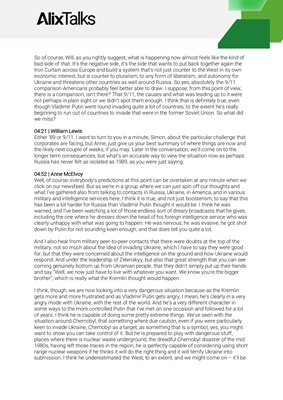
Enforcement in the Department of Commerce's Bureau of Industry and Security, Wendy offers
clients a unique combination of experience and insight as both a prosecutor and regulator
before courts and agencies.
Welcome to you all. What a fantastic panel we have here. And before we start, let me remind
you that if you have any questions that you'd like me to ask, please do submit them in the chat
function, and I will do the necessary. So, I want to dive straight in, if I may. The word
unprecedented has been used countless times during the COVID Pandemic, but it's fair to say
that it is equally fitting when looking at the sheer amount of sanctions on Russia following its
invasion of Ukraine.
Tom, in this flurry of sanctions on Russian oil assets, companies, individuals, obviously
including oligarchs, can you give us a sense of perspective, please, as a multi-year veteran of
the industry. How unusual a time is this? And give us that sense of understanding of how
different it is now.
04:39 | Tom Scampion
Thank you, Will. I'm delighted to be part of this panel. So, I think it is unprecedented.
Unprecedented is the right word. We were with the U.S. Treasury last week, and I was with a
couple of banks. And one of the banks is a top 10 global bank, and their head of sanctions,
their global head of sanctions, used the phrase that, in his view, this was the most significant
event in the history of economic sanctions. And I think he's right. I think he's right for probably
three reasons. I mean, one, it's been an incredibly hectic six weeks. I think it's six weeks to the
day since the Ukraine was invaded. But I think it's unprecedented for three reasons.
One is the volume - the sheer volume. To add a thousand names of entities, businesses and
individuals is phenomenal because it's not just the entities themselves, it's all their networks
that you have to then go and understand. So that volume is pretty unprecedented.
The second area I would point to is the speed. The EU are already on their fifth wave of
sanctions as they look to increase the reach of sanctions. Because, of course, the focus is on
effectiveness, always on effectiveness. We don't have comprehensive sanctions, we have
sanctions that are extensive, but they're yet to be comprehensive.
And the third area is coordination. I think the world has been positively surprised by the
coordination between the different jurisdictions and how people have looked to move together
in the U.S., the U.K., Canada and the European Union. And of course, there have been dramatic
events. I think the signal when Nord Stream 2 was cancelled, that was signaling to people this
is different. This is where sanctions have a cost to the people issuing the sanctions, but
they're done, nonetheless. So, I think that was an important moment.
Obviously, Swift expelling seven banks, that's big news. I mean, last time, that was, I think it
was 2012, for the Iranian banks. And then finally the coordinated efforts to sanction the
central Russian Bank and do so really speedily. I think that was pretty extraordinary. I think the
FT called it declaring financial war on Russia today. So, I think that all of those things come
together to say that this is a pretty unprecedented series of events. But as Simon said at the
beginning in his opening comments for understandable reasons.